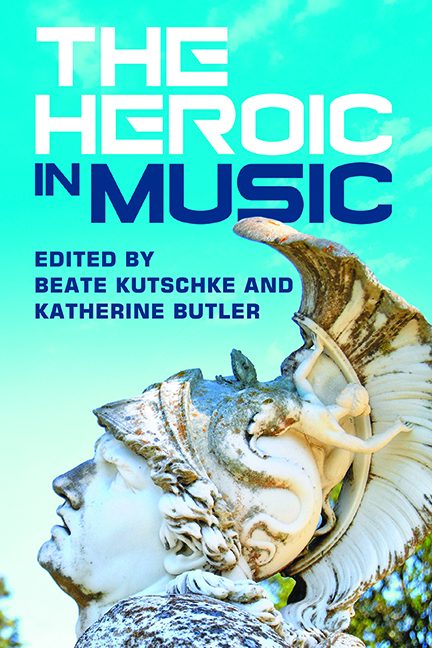Book contents
- Frontmatter
- Contents
- List of Illustrations
- Notes on Contributors
- Introduction
- Part I The Configuration of Heroic Music as a Tool for Shaping Moral and Political Identity
- Part II Music, its Ethics and Politics – Beyond ‘Beethoven Hero’
- Part III Heroic Music and its Moralities in Dictatorships and Post-Heroic Democracies
- Bibliography
- Index
5 - Design Principles for the Musical Heroic
Published online by Cambridge University Press: 16 July 2022
- Frontmatter
- Contents
- List of Illustrations
- Notes on Contributors
- Introduction
- Part I The Configuration of Heroic Music as a Tool for Shaping Moral and Political Identity
- Part II Music, its Ethics and Politics – Beyond ‘Beethoven Hero’
- Part III Heroic Music and its Moralities in Dictatorships and Post-Heroic Democracies
- Bibliography
- Index
Summary
The topography of the history of Western music set out by Donald Jay Grout in 1960 was one divided into a sequence of eras, with the Renaissance succeeded by the Baroque, the Baroque by the Classical, and the Classical by the Romantic. Yet what to do with Ludwig van Beethoven? On the one hand, Beethoven owed a considerable debt to the musical heritage of the Classical era, and in particular to Joseph Haydn and Wolfgang Amadeus Mozart. On the other hand, Beethoven's works clearly moved well beyond the practices and perspectives he had inherited from his predecessors. In an effort to capture Beethoven's place in the grand sequence of music history, Grout summoned a memorable image:
Through external circumstances and the force of his own genius he transformed this heritage and became the source of much that was characteristic of the Romantic period. But he himself is neither Classic nor Romantic; he is Beethoven, and his figure towers like a colossus astride the two centuries.
From this perspective, the coming of Beethoven represented a singular moment in the history of Western music, one that put the succession of eras in a new light. While there were certainly musicians of earlier times whose innovations contributed to the transformation of one era into another, conventional wisdom had it that there was none who was able to effect this change single-handedly. None, that is, until Beethoven, who was able to move beyond the bewigged proprieties of the eighteenth century by breathing into being music worthy of the liberated citizenry of a new era. According to this narrative these individuals, in their self-actualization, their struggles against impossible odds, their triumphs in the face of adversity, were heroes like none before, and their music – Beethoven's music – enacted, commemorated, indeed motivated their heroism.
There are, of course, any number of reasons why one might want to challenge this picture, not the least of which is its overwhelming emphasis on Vienna and Germanspeaking musicians. And yet, as Scott Burnham has shown, it can be very difficult to find alternatives: the compositional strategies evident in Beethoven's music – that is, in his heroic music – became a standard by which musicologists judged works of music, and explanations for why this should be so led inevitably back to the image of the colossus astride the centuries.
- Type
- Chapter
- Information
- The Heroic in Music , pp. 91 - 109Publisher: Boydell & BrewerPrint publication year: 2022

